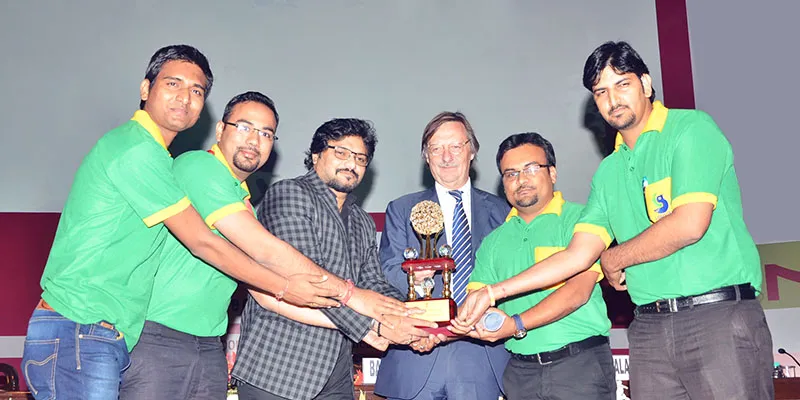This Jaipur-based startup has conceptualised an intelligent urban freight transportation system
The demography of India is changing, and very quickly at that. The biggest change has been the migration of population from rural areas to urban areas. This demographic shift has overhauled the distribution system in the country. Urban areas are at the centre, and the urban freight transport system is playing an important role in maintaining the distribution system.
The demand for urban freight transport has increased due to the concentration of the population in urban areas, as the majority of the industrial production is delivered there. Its efficiency is important because the distances involved in these kinds of activities has increased.

Focusing on developing a technology-based collaborative marketplace platform, Vikas Sethia (CEO), Anirudh Batwara (CTO), Vinay Jain (CFO), Sharwan Sharma (COO) and Darpan Pathak (IT Head) launched Logisure in July 2014. This Jaipur-based startup provides a comprehensive solution for urban freight movement in this segment. It has conceptualised an intelligent urban freight transportation system called “Intelligent Urban Delivery Network (i-UDAN)”.
“i-UDAN is a unique marketplace model, which connects various resources and stakeholders involved in the urban freight movement e.g. light goods vehicle operators, skilled drivers, delivery boys, auto manufacturers, with various users within the city,” says Anirudh, Co-founder, Logisure.in.
Logisure’s UDAN has also won a national award from Ministry of Urban Development, Government of India (2014) for being the best emerging initiative in urban freight mobility. The government has recommended UDAN to be established in all cities of the country.
He adds that Logisure.in offers ‘Delivery Infrastructure as a Service (DIaaS)’ to all users in the city, on a pay-per-use basis, by creating a common pool of the available infrastructure that can make intra-city deliveries and work on distribution of goods.
Current growth of venture
Currently, the venture is growing at the rate of 100 percent month-on-month, both in terms of volume of transactions handled, and turnover. By this year’s end, it will have more than 10,000 screened and verified delivery van operators on the network (i-UDAN), and will have presence in over five cities, both tier I and tier II.
The venture’s customer list consists of small retailers, large retail chains, distributors, manufacturers, e-commerce players, NGOs and government organisations etc.
Anirudh says the customers are extremely receptive to this project. Their fixed delivery costs have now changed into a variable cost model. Many captive fleet owners have now attached their fleet to this network (UDAN), and are using the services of network on a pay-per-use model. Delivery costs of a majority of the clients have reduced by more than 20 percent to 50 percent and they are able to expand their operations based on assured distribution service even in peak times.
Claims to be alone in sector
Logisure claims it is the only private player in the sector that is developing comprehensive solutions for urban freight movement, using data analytics, technology, collaboration and knowledge of urban freight as a tool.
Dismissing the competition from other companies in the logistics sector, Anirudh says, “There is no such startup or established company which is providing comprehensive solutions for urban freight mobility. Some companies focus only on technology while others focus only on narrow areas like food delivery and e-commerce parcels.”
Other players in logistics
Though Logisure claims to be the only venture providing this kind of technology-driven service in the urban freight segment, the role of other startups can’t be discounted or undermined. Loginext and The Porter, two known players in the logistic segment, also claim to have a firm hold on the market.
These other companies are being heavily invested in; another reason why it is impossible to discount them. Last month, logistics marketplace The Porter raised Rs 35 crores from Sequoia, Kae Capital and others. Porter claims to have over 300 vehicles handling 10,000 transactions every month in Mumbai and NCR, with plans to ramp up to six cities in the next one year.
In April, Mumbai-based LogiNext raised a seed round of a little over a half million USD from the Indian Angel Network.
Size of industry
The logistics industry in India is about $130 billion in size, with the intra-city logistics segment accounting for $10 billion.
The small commercial vehicle segment is the largest segment within the commercial vehicle industry, with sales of 432,000 units in FY 2014. This contributed 60 percent to the overall industry. The small commercial vehicle industry is expected to reach 919,000 units by FY 2020, growing at a rate of 13 percent annually over the next six years. Small commercial vehicle goods continue to be the biggest segment within small commercial vehicle segment and will account for over 80 percent of the total market by FY 2020.
Expecting funding
The venture is self-funded. It spent the initial investment on R&D in the subject of urban freight, technology development, building network of urban delivery van operators and expansion in multiple cities.
“Since the beginning, we have received offers from several individuals and institutions who wish to invest in our venture. We’d always wanted to keep it bootstrapped until proof of concept was done, and then use money from investors only for expansion. Having proved the concept in two cities now, we would now like to start raising funds to expand further,” says Anirudh.
Addressing challenges
There is great inefficiency in intra-city operations, lack of data for efficient planning, lack of use of technology, and no consideration of urban freight mobility in planning of smart and future cities.
“Logisure’s i-UDAN connects all stakeholders involved in urban freight, and is trying to develop a viable comprehensive solution with use of technology, data analytics, collaboration and knowledge of urban freight,” says Anirudh.







